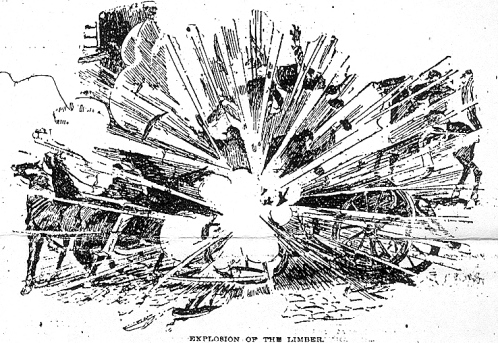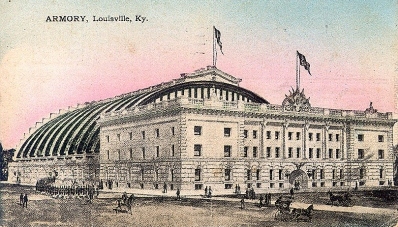
1895 Louisville Legion Artillery Explosion artwork.
The deaths of
- Corporal Arthur L. Robinson
- Private Charles Biechner
- Private Archibald McBride
- Private Charles C. Woods
- Mr. William Adams, Sr. (Civilian)
Battery A, 1st Regiment (Louisville Legion) of the Kentucky State Guard 1895
One of the most significant events in the history of Louisville was its hosting of the 29th Encampment of the Grand Army of the Republic (GAR), September 11-13, 1895. The city's leaders planned two years for this event which, had no rival at the time, making national political party conventions a distant second.
The theme of the encampment was to be reconciliation between the old warriors, since this was the first held below the Mason-Dixon Line. It was attended by dignitaries and Civil War leaders from both sides who came to be honored and to speak.
An estimated 150,000 veterans attended the convention. The high point of the encampment was the parade, with some 30,000 old veterans participating. The parade length and a temperature of 94 degrees held the number of marchers down, as many old veterans struggled to complete the journey. The Kentucky GAR had the honored position of marching last.
Throughout the encampment many other events took place. It was a constant cycle of campfires, reunions, speeches and concerts, many held simultaneously. Excursions went to points of interest such as to cemeteries; Lincoln's birthplace and West Point for the units that helped build and served at Fort Duffield.

Louisville Legion Armory.
On the morning of the parade two cannon crews of Battery A, 1st Regiment of the Kentucky State Guard, known as the Louisville Legion were dispatched from the downtown Louisville armory to Phoenix Hill Park to fire a 44 gun salute at sunrise to awaken the city. Each cannon was to fire 22 times. When the second caisson, which was 15 minutes behind the first, reached 4th and Broadway at 5:30 a.m. an explosion occurred. Forty-four bags of carefully packed black powder; each weighing 1.5 lbs., mysteriously ignited. The result was five men and two horses killed several people injured and property damage to buildings in the area.
Those killed were Corporal Arthur Langan Robinson, age 26 of 2233 Grayson (Cedar) Street. Private Charles Brechner (Biechner), 24 of 1534 Grayson (Cedar) Street. Private Charles C. Woods, 20 of 1031 Vine Street. Private Archibald McBride, 16 of 625 West Chestnut Street and a civilian, Mr. William Adams Sr., 49 the driver of the caisson.
Also riding on the caisson were Sergeant Fred Conn and Private E. M. Hobbs. They received cuts, bruises and severe powder burns. Captain David Castleman, the officer in charge was lifted 15 feet off his horse but escaped injury.
The area was quickly cleaned up as bystanders and scavengers carried off various fragments as souvenirs. The parade took place as scheduled passing over the very spot where the explosion happened only hours earlier. Only minor vestiges of the explosion were evident. This caused hard feelings among some legion members who felt the parade should be canceled or at least the route detoured.
Louisville Legion Commander Colonel John B. Castleman called for an immediate court of inquiry to determine the cause of the explosion. Castleman was adamant that the explosion was not caused by carelessness and called reports that the men were smoking ridiculous. He stated "The powder was packed by my son (David) and Sergeant Conn, one of the most experienced men in the Legion. The men were chosen for the honored detail because of their ability and conscientiousness. Even if someone were smoking it would have no effect because powder bags were stored in air-tight water proof containers."
Bystanders volunteered that they saw no one smoking, but one eyewitness, Mrs. Flora V. Foree said, "I saw the men coming down the street with the cannon drawn by two horses. They were all seated on it laughing and talking. One of the men seated on the caisson was smoking a cigar. I heard one of the men say to him 'Look out for the sparks from the cigar'. He was just about to knock off the ashes when a moment later the explosion came. I was knocked down, if l had not been I should surely have been killed for splinters came through the doorway two feet long, some were heavy enough to kill anyone with the velocity at which they traveled".
The bodies were taken to Wyatt's Undertaking at 7th and Market Streets for preparation. McBride and Woods remained at Wyatt's while Robinson and Brechner (Biechner) were taken to the homes of their grief stricken parents. The Louisville Legion stood guard at locations where the bodies were, including the armory where the damaged weapons and cannons were stored. This was to keep the curious and souvenir seekers away.
On the 13th the bodies were taken to the armory where they lay in state until 3 p.m. At that time the remains escorted by 24 pall bearers from Battery A, specially selected by Colonel Castleman and the entire Louisville Legion proceeded to Christ Church Cathedral for a joint 4 p.m. funeral.
The paper reported that the church was filled with the Legion reporting; "The spacious building was crowded to the doors, many person unable to secure even standing room. The congregation seem to be animated by sincere sorrow rather than by curiosity, which is too often the practice under such circumstances".
The bodies were then buried in Cave Hill Cemetery in section O, Louisville Legion Lot 244, grave numbers 3,4,5,6. They were laid to rest with military honors and several gun salutes were fired.
Mr. William Adams Sr., an African-American was also killed in the explosion. Mr. Adams had been hired by the officers of the Louisville Legion to drive the caisson to Phoenix Hill. His remains were taken to his home, his funeral was held the same day as the four men of the Legion were being buried at Cave Hill.
After the funeral the John Fowler Camp #1, Son of Veterans held a special meeting and released resolutions of sorrow for the four soldiers and expression of sympathy for Battery A stating the memory of the dead will be kept alive by a record in the minutes of the organization.
Private E. M. Hobbs who survived the explosion recalled it was a grand party that started to Phoenix Hill. All were playful boyish young men, and the bracing early morning air and their enthusiasm to the work in which they soon expected to be engaged made them light hearted. They joked with each other and everyone else they saw. Hobbs told a funny story he had heard the night before and when he finished all laughed heartily. Robinson spoke of the firing of the salutes and of how the noise would awaken the people who were then sleeping. Then they all laughed again. It was great fun.
"I have not been home since last night", Robinson said. "I told my mother I would be out all night, and I guess she won't be uneasy." "Of course she won't, she knows you are all right" replied one of his comrades, and the gun carriage with its load proceeded on its supposed harmless peaceful way.
The papers reported that liberal donations were being collected in a memorial fund for the unfortunate Legion boys, this to be used for the immediate needs of the families of the dead, and a lasting monument to be a silent sentinel over their graves at Cave Hill.
Due to the fine treatment by the city of Louisville towards the GAR during it's encampment the Son's of Veteran's voted to hold their next national encampment in Louisville, 8-10 September 1896. On 11 September 1896, the Louisville Legion and the Son's of Union Veterans had a memorial service for the victims of the explosion part of which was the planting of the two cannons of A Battery in the Legion burial plot.
The following statement appeared in the newspaper. "Owing to the fact that the regiment will have a parade on this occasion, Colonel Castleman was unwilling to order the men to turn out for the Son's of Veteran's parade tomorrow, but a volunteer detachment will take part. It is hoped that there will be a good attendance and every man who can leave his business is expected to turn out. The duty is one the regiment owes to the visitors, and it is hoped that the employers will be public spirited enough to grant their men a half-holiday. All volunteers will report to Lieutenant Colonel Belknap tomorrow morning at 8 o'clock".